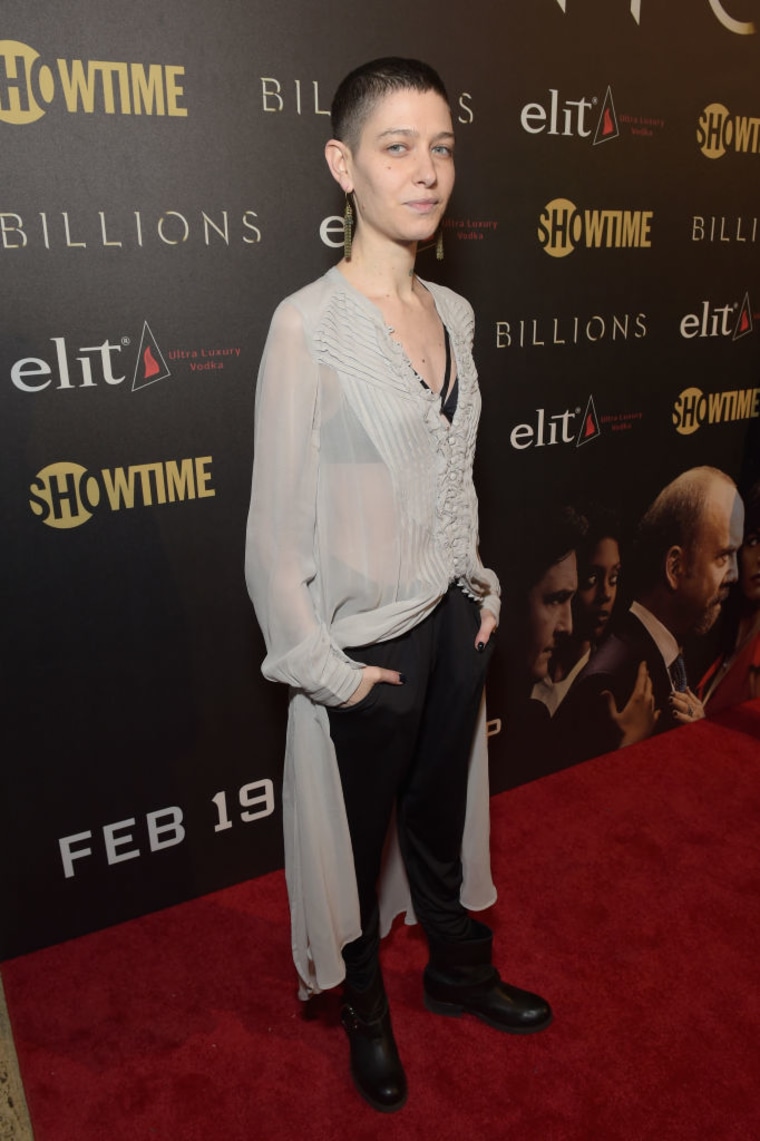On this season's "Billions," actor Asia Kate Dillon is stealing scenes as Taylor Mason, the financial wunderkind who is helping Damian Lewis' Bobby Axelrod scheme his way to fame and fortune.
Showrunners David Levien and Brian Koppelman auditioned cis, trans and gender non-binary actors for the role, and cast Dillon after the third audition. Dillon's performance not only inspired the writers to give Dillon more to do, but also impressed everyone on set.

"Our cast and crew, basically to a person, all came up to us after Asia's first day with the general attitude of 'holy s-t that person is amazing,'" report the creators. "And that only grew throughout the season."
That the star would be a contender for the upcoming Emmy Awards is a given -- but when Showtime asked which category Dillon wanted to be submitted under, Dillon had to give it some thought. The performer identifies as gender non-binary, and choosing between "supporting actor" and "supporting actress" sparked a conversation -- as well as some homework.
"What I learned through my research is that the word 'actor,' specifically in reference to those who performed in plays, came about in the late 1500s as a non-gendered word," says Dillon. "It applied to all people, regardless of anatomical sex or gender identity." The word "actress," Dillon learned, came into being to define anatomically female performers.
So Dillon sent an impassioned letter to the Television Academy, questioning the gender-specific classifications of the acting categories. "I wanted to get more information from the Academy as to whether or not they use the word actor or actress to refer to assigned sex or identity, so that I could make the best decision for myself as to how I wanted to be submitted," Dillon tells Variety.
From Dillon's letter to the Academy:
"I'd like to know if in your eyes 'actor' and 'actress' denote anatomy or identity and why it is necessary to denote either in the first place? The reason I'm hoping to engage you in a conversation about this is because if the categories of 'actor' and 'actress' are in fact supposed to represent 'best performance by a person who identifies as a woman' and 'best performance by a person who identifies as a man' then there is no room for my identity within that award system binary. Furthermore, if the categories of 'actor' and 'actress' are meant to denote assigned sex I ask, respectfully, why is that necessary?"
The letter got an immediate response from the Academy, and led to what Dillon describes as a thoughtful exchange. Dillon was surprised to learn that Academy rules say that "anyone can submit under either category for any reason," says Dillon.
"The Academy supports anyone's choice to do that, and the Academy is not going to do any sort of check," Dillon says. Indeed, Emmy rules for the acting categories do not specify gender qualification, saying simply "for a continuing performance in a regular series."
"I found them to be 100% supportive," Dillon says of the Academy. "I really couldn't have been happier."
"We are happy with our productive dialogue with Asia based on their very thoughtful letter," a spokesperson for the TV Academy told Variety. "The Television Academy celebrates inclusiveness, and as we discussed with Asia, there is no gender requirement for the various performer categories. Asia is free to choose the category they wish to enter."
Related: Judge Grants Oregon Resident Right to Be Genderless
Dillon ultimately decided to enter as supporting actor, and let SAG-AFTRA know of the decision as well. "Given the choice between actor and actress, actor is a non-gendered word that I use," Dillon says. "That's why I chose actor."
Dillon hopes this sparks a larger conversation about category definitions overall, given that writing and directing aren't gender-specific. "I can only speak to the world in which I wish to live," says Dillon. "I think this is a really good place to start a larger conversation about the categories themselves, and what changes are possible and what may or may not be coming. I'm excited to see what other people think, and what they want to say once they become aware of this."